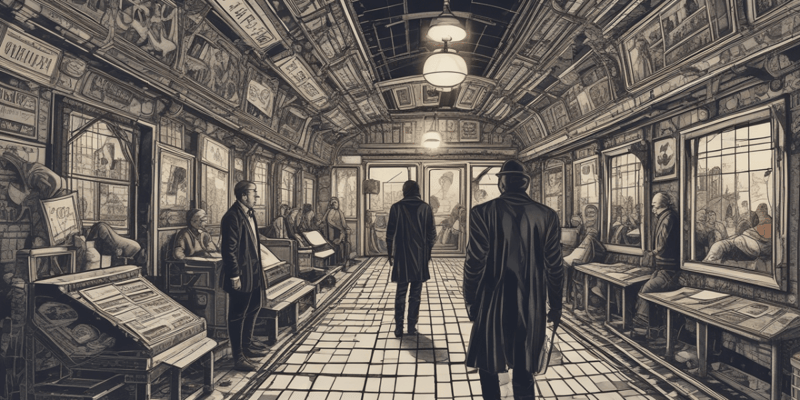Podcast
Questions and Answers
What does social control theory primarily emphasize as a reason for deviance?
What does social control theory primarily emphasize as a reason for deviance?
Which of the following best defines primary deviance?
Which of the following best defines primary deviance?
What is the focus of strain theory in relation to crime?
What is the focus of strain theory in relation to crime?
In the context of differential association theory, how is deviant behavior primarily learned?
In the context of differential association theory, how is deviant behavior primarily learned?
Signup and view all the answers
Which of the following is an example of a hate crime?
Which of the following is an example of a hate crime?
Signup and view all the answers
What distinguishes corporate crime from other types of crime?
What distinguishes corporate crime from other types of crime?
Signup and view all the answers
What is the chief characteristic of negative sanctions?
What is the chief characteristic of negative sanctions?
Signup and view all the answers
What role does the corrections system play in the criminal justice system?
What role does the corrections system play in the criminal justice system?
Signup and view all the answers
What does labeling theory suggest about the impact of societal perceptions on individuals?
What does labeling theory suggest about the impact of societal perceptions on individuals?
Signup and view all the answers
Study Notes
Deviance and Crime
- Deviance is any behavior that violates social norms.
- Crime is a specific form of deviance that violates laws and is punishable by formal sanctions.
- Formal sanctions are official punishments for breaking the law.
- Informal sanctions are punishments for breaking social norms that come from individuals rather than institutions.
- Positive sanctions are rewards for conforming to norms.
- Negative sanctions are punishments for violating norms.
Theories of Crime
- Differential association theory suggests that individuals learn deviant behavior from their close associates.
- Strain theory argues that crime occurs when there is a gap between socially acceptable goals and the means to achieve them.
- Social disorganization theory proposes that crime is more common in communities with weak social ties and a lack of social control.
- Control theory emphasizes that social bonds and feelings of connection to society deter deviant behavior.
- Labeling theory focuses on how societal reactions to deviance can lead to changes in an individual's self-concept and behavior.
- Conflict theory examines social and economic factors as the root causes of crime.
Types of Crime
- Street crime refers to offenses committed by ordinary people in public spaces.
- Violent crimes involve the use of force or threat of force.
- Nonviolent crimes involve property destruction or theft without force.
- Corporate crime is committed by white-collar workers in a business environment.
- Victimless crimes involve activities against the law but do not harm anyone other than the individual engaging in them.
- Hate crimes are motivated by bias against a person's race, religion, or other characteristics.
The Criminal Justice System
- The criminal justice system consists of law enforcement, the courts, and corrections.
- Police enforce laws and maintain public order.
- Courts decide legal disputes based on the law.
- The corrections system supervises individuals who have been arrested, convicted, or sentenced for criminal offenses.
Important Concepts
- Social control refers to the regulation and enforcement of social norms.
- Social order is the stable arrangement of practices and behaviors that society relies on.
- Legal codes are formal systems of laws to maintain social control.
- Master status is a label that defines an individual's primary characteristic, and can be a result of deviant behavior.
- Power elite refers to a wealthy and influential group that holds significant power and resources.
- Self-report studies collect data using voluntary responses from individuals.
- Primary deviance refers to initial norm violations without lasting consequences for identity.
- Secondary deviance occurs when a label of deviant behavior leads to changes in an individual's self-concept and behavior.
Studying That Suits You
Use AI to generate personalized quizzes and flashcards to suit your learning preferences.
Description
Explore the nuanced concepts of deviance and crime in this quiz. You'll learn about the differences between formal and informal sanctions, as well as key theories explaining criminal behavior, such as differential association and strain theory. Test your understanding of how social norms influence behavior and community dynamics.




